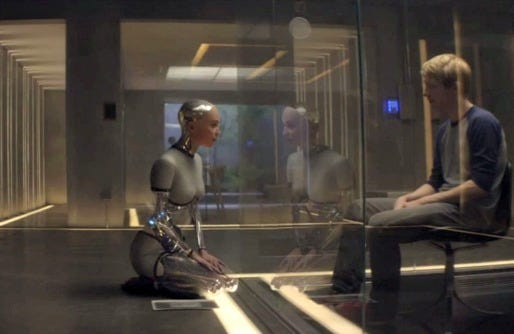Ex Machina

Moody and evocative, “Ex Machina” is a well-made science fiction thriller that I quite admired even as I realized it didn’t reach its full potential. It starts out with a very novel concept and moves forward with it in such a direct way that it held very few surprises.
It seems like a smart movie that outsmarted itself.
The idea is the creation of the first real artificial intelligence by mankind, manifested in a robot named Ava. She has been built as an expressly female entity with all the imperatives of attraction that entails. So a man — technically brilliant but socially awkward — interacts with her and begins to develop feelings.
This premise is not entirely original; other movies like “S1m0ne” and “Her” have explored the idea of a guy falling for a virtual construct, with varying degrees of success. Writer Alex Garland (“Never Let Me Go”), who also makes his directing debut, cleverly adds the idea of the third wheel: The man who created the robot has hired the other man to test it, and watches the two of them interact with some apparent mix of scientific inquiry and malevolence.
The result is a weird, disquieting love (?) triangle in which three beings, one of them mechanical, wage a struggle of wills.
Oscar Isaac plays Nathan, a genius programmer who created Bluebook, the world’s dominant search engine, while still a teenager. (Think Mark Zuckerberg and Bill Gates, combined.) Now he lives in a research facility in the middle of a vast mountainous estate, where the only way in is a two-hour helicopter ride. Caleb (Domhnall Gleeson), a meek young coder in his employ, wins a contest for a special week-long stay with a life-changing (but unspecified) opportunity.
The underground domicile, with weird amalgamations of modern and traditional appointments, is something between a retreat and a prison. Caleb can go some places but not others. It’s comfortable, antiseptic and stifling. Like the hotel in “The Shining,” it serves as another character in the story.
Nathan lives there seemingly alone, binging on work, alcohol and exercise. He’s at once very charismatic and off-putting. He jokes with Caleb about having the men who installed his power grid killed afterward, and seems to enjoy the ambiguity his tone leaves in the younger man’s mind. He tells Caleb that he has created an A.I., and he has been chosen to test it to see if it can pass as human.
Caleb’s first interactions with Ava are hesitant and promising. She is an amazing creation, played by Alicia Vikander with some arresting makeup and CG effects. Her face, hands and feet are seemingly human, but the rest of her is a twist of metal parts, lighted circuitry and a geodesic mesh covering.
They interact through a glass wall; Ava has apparently never left the room in which she lives. Despite this distance, they soon start to share intimacies about themselves. Given the opportunity for more private conversation, they each reveal their suspicions about Nathan’s true motives.
Things go from there, which I will not reveal. Suffice it to say that on several occasions I thought Garland had an opportunity to take a sharp turn into bolder territory, and each time he chooses the straightforward course. There’s one bit where the story starts to wander down a more interesting path, but quickly retreats to the road more traveled.
“Ex Machina” hints at deeper themes that are largely left unexplored — how men objectify women, can consciousness be created artificially, etc. But for what it is, I recommend the film for its dark imaginings.
4 Yaps



